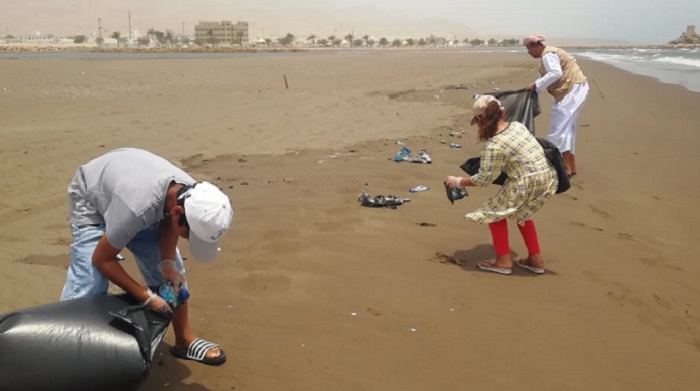
Muscat: Thousands of bags of detergent that scattered in the waters off Muscat came from a ship that sank outside the territorial waters of the Sultanate of Oman, on 5 June.
The ship – which flew an Indian flag – carried 20 crew members, all Indian nationals, confirmed an official from the Environment Authority (EA), adding that they were picked up by another cargo vessel near the site of the mishap, and taken to Sultan Qaboos Port. The ship was passing outside Omani territorial waters while sailing from one country to another.
“We received a report of the sinking of the ship at 4:50pm on 5 June,” said Mamdouh bin Salem Al Marhoun, acting director of the Environment Authority’s Environmental Emergency Centre. “We had sent a report to the required authorities to know more about the cargo of the boat, but unfortunately, they could not find out, as the ship had sunk by then.”
After the ship sank, the cargo floated to the surface of the sea, and began floating towards the Omani coastline, particularly the region from Quriyat to Seeb: Many of the bags that came to the surface were discovered in this region, as well as the Daymaniyat Islands.
Most of the damage from the detergent and plastic waste has been seen in Quriyat, Al Hail, and the aforementioned islands. It was later found out that the majority of the consignment was detergent, as well as some tyres.
Reports of bags of detergent in Omani waters first began circulating when divers and tour groups near these areas saw them floating on the surface of the sea. Marine birds stood on some of the bags, pecking at them in an attempt to get them open, hoping it might contain something for them to eat.
“The detergent is going to cause huge damage to our ocean ecosystems, so we need to act fast to remove as much of it as possible,” said Abdullah Al Maskari, a diving instructor in Oman. “Turtles and other marine animals will look at these bags and think they are jellyfish, because that makes up a part of their food, and they will attempt to eat these bags. This is going to cause a lot of problems for them. Furthermore, they could affect the coral formations in the sea, and this could have very adverse consequences.”
“We don’t know the exact number of detergent bags at sea, but it is safe to say that they number in tens of thousands,” Al Maskari said. “The detergent packets were stored in bigger packs, which when split open released hundreds of smaller ones, almost like a cluster bomb, and that magnifies their damage.”
Al Marhoun from the Environment Authority added that no fish or other maritime lives have been lost so far, but reports of marine deaths could surface in the coming days. “What is providing us some reassurance in this matter is that most of the bags are still closed, so they will be easy to remove, and cannot be accessed by marine animals for the time being,” he said. “But as you know, 85 percent of maritime environmental pollution is because of plastic, which is what these bags are made from. This could cause marine animals to die, unfortunately, but we hope such incidents do not happen.”
To assist with the cleanup, a volunteer campaign to clean up the Daymaniyat Islands was organised on Saturday, involving the participation of citizens, residents, government institutions and private authorities.
“We are also scanning certain areas like Sifah and Qurum to see if any bags have been found there, but no more than two or three were discovered in these locations,” added Al Marhoun. “On Tuesday, we will run another campaign to clean the coastline from Seeb to Al Azaiba.”